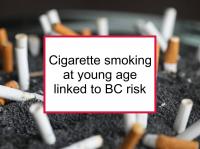Generally speaking, cigarette smoking increases the risk of breast cancer only modestly. However, certain circumstances increase risk. Women who start smoking during their teenage years and women who smoke heavily for decades have higher risks. Smoking is also associated with a younger age at breast cancer diagnosis.
The evidence generally is mixed for passive smoking. However, exposure to passive cigarette smoke during the prenatal period and childhood both have been found to increase subsequent breast cancer risk. Now a new study has confirmed that starting to smoke during adolescence increases breast cancer risk. The study also has reported that a family history of breast cancer heightens smoking-associated breast cancer risk.
Tobacco smoke contains at least 70 known carcinogens. This includes persistent breast carcinogens such as polycyclic aromatic hydrocarbons (PAHs) and cadmium. Cigarette smoke has been shown to increase the ability of cancer cells to move and to metastasize. Cigarette smoking may interfere with endocrine treatment by increasing estrogen receptor (ER) activity. Nicotine appears to protect breast cancer cells from programmed cell death, suggesting that electronic cigarettes might also contribute to breast cancer risk.
Smoking is associated with reduced survival after a diagnosis of breast cancer, including among male breast cancer patients. The negative effect of smoking on breast cancer survival was found to be highest among women who were normal weight or underweight (BMI < 25) in one study. High consumption of carotenoids (in food, not from supplements) was linked to reduced risk of premenopausal, but not postmenopausal, breast cancer among smokers in another study. Stopping smoking after a diagnosis of breast cancer appears to reduce, but not eliminate, the heightened risk of recurrence associated with smoking.
Latest research: Both young age & family history affect smoking risk
The study referenced above was designed to investigate the link between smoking and breast cancer risk. To conduct the study, the authors used data from the Generations Study cohort (United Kingdom) to estimate risk while adjusting for relevant potentially confounding factors, including alcohol consumption. The study included 102,927 initially cancer-free women who entered the Generations Study between 2003 and 2013 and were followed for an average of 7.7 years. A total of 1,815 of the study participants developed invasive breast cancer during follow-up.
Compared to never smokers, women who had ever smoked were found to have a 14% higher risk of breast cancer. Those who started smoking before age 17 had a 24% higher risk and those who started smoking one to four years after starting to menstruate had a 23% higher risk than never smokers. Breast cancer risk was not found to be linked to the length of time between when smoking started and age of first birth.
Women with a family history of breast cancer experienced a significantly higher increase in breast cancer risk associated with smoking. Compared to never smokers, women with a family history who had ever smoked were found to have a 35% higher risk of breast cancer. The risk was increased both for those who began smoking before age 17 and those who started smoking one to four years after menarche.
The authors conclude that smoking is associated with a modest but significantly increased risk of breast cancer, especially among women who start smoking during adolescence. Furthermore, the relative risk of breast cancer linked to smoking is greater for women with a family history of the disease.
